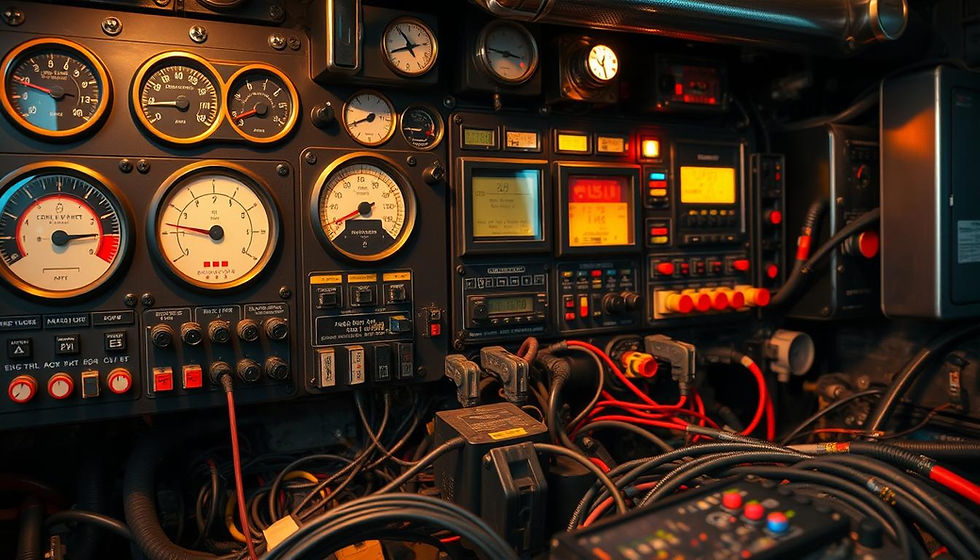How to Spot Early Warning Signs That Signal Heavy Equipment Repair?
- alanthetruckrepair
- Jan 8, 2025
- 4 min read

Heavy equipment is critical for the construction, mining, agriculture, and transportation industries. These machines often operate in demanding environments and are essential for completing tasks efficiently and on time. However, like any machinery, heavy equipment can experience wear and tear over time. Spotting early warning signs of potential issues can save you substantial time, money, and headaches by preventing catastrophic breakdowns and costly repairs. In this blog, we’ll explore the key signs that indicate heavy equipment repair and why addressing these early can prolong the life of your machinery.
Unusual Sounds
Heavy equipment operates smoothly with minimal noise variations. If you start hearing strange or unusual sounds, such as grinding, banging, or squealing, it’s a clear sign that something may be wrong.
These noises could indicate issues with gears, bearings, or hydraulic systems.
For example, a grinding sound might suggest worn-out bearings, while a squealing noise could indicate a slipping belt. Managing these issues can prevent further damage and reduce downtime.
2. Fluid Leaks
Leaking fluids are among the most common warning signs of heavy equipment problems. Any sign of a leak should be taken seriously, whether it’s oil, hydraulic fluid, or coolant.
Leaks often indicate worn seals, loose connections, or damaged hoses. Ignoring leaks can lead to low fluid levels. It can result in overheating, reduced efficiency, or complete system failure. Regular inspections can check for fluid puddles or drips under the equipment.
3. Decreased Performance
If your equipment isn’t operating as efficiently as it used to, it’s time for an analysis. Issues in the engine, hydraulic system, or drivetrain could cause a decrease in power, slower operation, or difficulty performing tasks.
For example, if a bulldozer struggles to push loads it previously handled easily, it could point to engine wear, clogged filters, or problems with the hydraulic pump. Prompt heavy equipment repair can revive the equipment to its optimal performance level.
4. Excessive Exhaust Smoke
Excessive or unusual exhaust smoke indicates something is wrong with the engine, and you need to hire heavy equipment repair specialists. Different colors of smoke can indicate various issues:
Black smoke:
Denotes incomplete combustion. It is often caused by a clogged air filter, fuel injection problems, or a faulty turbocharger.
White smoke:
This may signal coolant entering the combustion chamber. It occurs likely due to a blown head gasket or cracked cylinder head.
Blue smoke:
Suggests burning oil, which could result from worn piston rings or valve seals.
Addressing exhaust issues can avert further engine damage and reduce harmful emissions.
5. Warning Lights and Error Codes
Modern heavy equipment has diagnostic systems that display warning lights or error codes when something is wrong. It might be tempting to ignore these alerts. But they are crucial for specifying likely problems.
For instance, a warning light for low oil pressure could indicate a failing oil pump. At the same time, an overheating alert may point to cooling system issues. Consult the equipment’s manual or a proficient technician to interpret error codes and resolve the underlying issues.
6. Irregular Hydraulic Performance
Hydraulic systems are vital for heavy equipment operation, powering functions such as lifting, digging, and pushing. If you notice slow or erratic hydraulic responses, leaks, or unusual noises, it’s a sign of trouble.
Low hydraulic fluid levels, clogged filters, or damaged hoses can lead to reduced performance or complete hydraulic failure. Regularly inspecting the hydraulic system and addressing minor issues can prevent costly repairs. Call a heavy equipment repair service immediately if you detect this issue.
7. Overheating
Frequent overheating is a major red flag for heavy equipment. It can result from a failing cooling system, low coolant levels, or clogged radiators.
Ignoring overheating can lead to severe engine damage, including warped cylinder heads and cracked blocks. Pay attention to temperature gauges and stop using the equipment if it consistently operates above safe temperature levels.
8. Uneven Wear on Tires or Tracks
Uneven wear on equipment with tires or tracks is a sign that alignment or suspension components may be out of balance. Misaligned tires or tracks can lead to poor traction, lower fuel efficiency, and accelerated wear on other elements.
Regularly check tires and tracks for wear patterns and address any alignment issues to prevent further damage. Technicians providing heavy equipment repair can rectify the issue efficiently.
9. Difficulty Starting
If heavy equipment has trouble starting, it could be due to many issues. Battery problems, a failing starter motor, or fuel delivery troubles are the main culprits. Persistent starting problems not only delay projects but can also strain other components.
Ensure the battery is charged, connections are clean, and fuel filters are replaced regularly. If starting issues persist, have a technician inspect the ignition and fuel systems.
10. Vibrations or Unusual Movements
Excessive vibrations or jerky movements during operation are often signs of mechanical issues. Worn-out bearings, loose bolts, or misaligned components can cause these problems.
Ignoring these symptoms can lead to further damage and compromised safety. Regular maintenance checks can identify the root cause and prevent costly repairs.
Conclusion
Spotting early warning signs that signal heavy equipment repair is essential for maintaining productivity, reducing costs, and extending the life of your machinery. From unusual sounds and fluid leaks to performance issues and warning lights, staying vigilant can help you address problems before they escalate. Regular inspections, proper maintenance, and prompt heavy equipment repair from Alan The Truck Repair Master INC, are the keys to keeping your heavy equipment in top condition. By prioritizing these practices, you can minimize downtime, enhance safety, and ensure your equipment continues to deliver optimal performance for years to come.





Comments